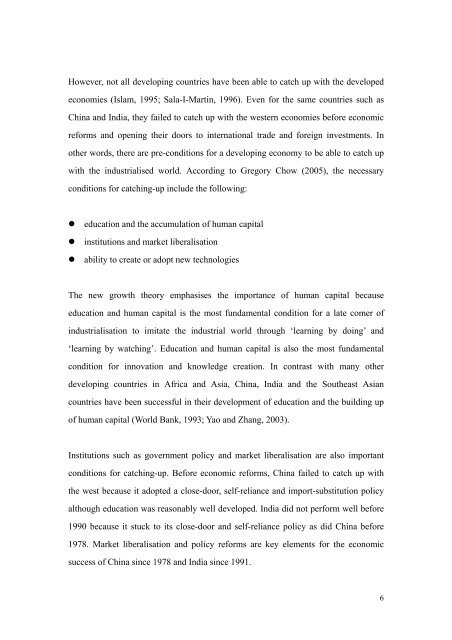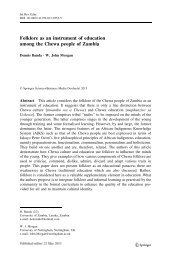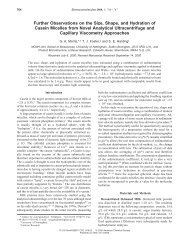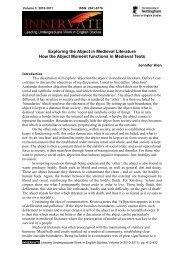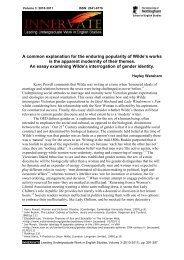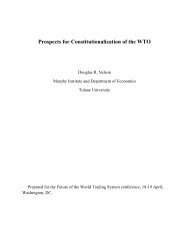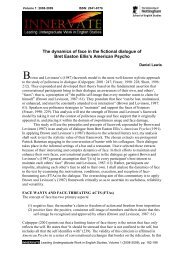FDI as a Shifter and a Mover of Economic Growth in a Newly ...
FDI as a Shifter and a Mover of Economic Growth in a Newly ...
FDI as a Shifter and a Mover of Economic Growth in a Newly ...
Create successful ePaper yourself
Turn your PDF publications into a flip-book with our unique Google optimized e-Paper software.
However, not all develop<strong>in</strong>g countries have been able to catch up with the developed<br />
economies (Islam, 1995; Sala-I-Mart<strong>in</strong>, 1996). Even for the same countries such <strong>as</strong><br />
Ch<strong>in</strong>a <strong>and</strong> India, they failed to catch up with the western economies before economic<br />
reforms <strong>and</strong> open<strong>in</strong>g their doors to <strong>in</strong>ternational trade <strong>and</strong> foreign <strong>in</strong>vestments. In<br />
other words, there are pre-conditions for a develop<strong>in</strong>g economy to be able to catch up<br />
with the <strong>in</strong>dustrialised world. Accord<strong>in</strong>g to Gregory Chow (2005), the necessary<br />
conditions for catch<strong>in</strong>g-up <strong>in</strong>clude the follow<strong>in</strong>g:<br />
• education <strong>and</strong> the accumulation <strong>of</strong> human capital<br />
• <strong>in</strong>stitutions <strong>and</strong> market liberalisation<br />
• ability to create or adopt new technologies<br />
The new growth theory emph<strong>as</strong>ises the importance <strong>of</strong> human capital because<br />
education <strong>and</strong> human capital is the most fundamental condition for a late comer <strong>of</strong><br />
<strong>in</strong>dustrialisation to imitate the <strong>in</strong>dustrial world through ‘learn<strong>in</strong>g by do<strong>in</strong>g’ <strong>and</strong><br />
‘learn<strong>in</strong>g by watch<strong>in</strong>g’. Education <strong>and</strong> human capital is also the most fundamental<br />
condition for <strong>in</strong>novation <strong>and</strong> knowledge creation. In contr<strong>as</strong>t with many other<br />
develop<strong>in</strong>g countries <strong>in</strong> Africa <strong>and</strong> Asia, Ch<strong>in</strong>a, India <strong>and</strong> the Southe<strong>as</strong>t Asian<br />
countries have been successful <strong>in</strong> their development <strong>of</strong> education <strong>and</strong> the build<strong>in</strong>g up<br />
<strong>of</strong> human capital (World Bank, 1993; Yao <strong>and</strong> Zhang, 2003).<br />
Institutions such <strong>as</strong> government policy <strong>and</strong> market liberalisation are also important<br />
conditions for catch<strong>in</strong>g-up. Before economic reforms, Ch<strong>in</strong>a failed to catch up with<br />
the west because it adopted a close-door, self-reliance <strong>and</strong> import-substitution policy<br />
although education w<strong>as</strong> re<strong>as</strong>onably well developed. India did not perform well before<br />
1990 because it stuck to its close-door <strong>and</strong> self-reliance policy <strong>as</strong> did Ch<strong>in</strong>a before<br />
1978. Market liberalisation <strong>and</strong> policy reforms are key elements for the economic<br />
success <strong>of</strong> Ch<strong>in</strong>a s<strong>in</strong>ce 1978 <strong>and</strong> India s<strong>in</strong>ce 1991.<br />
6


